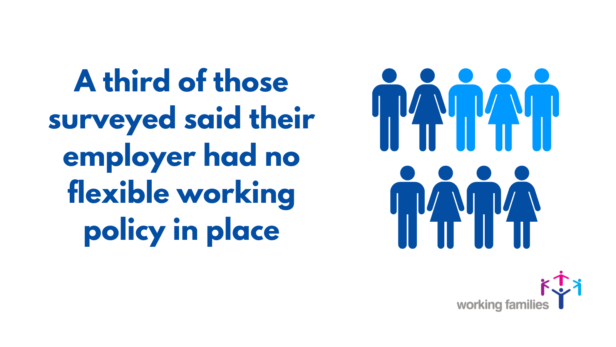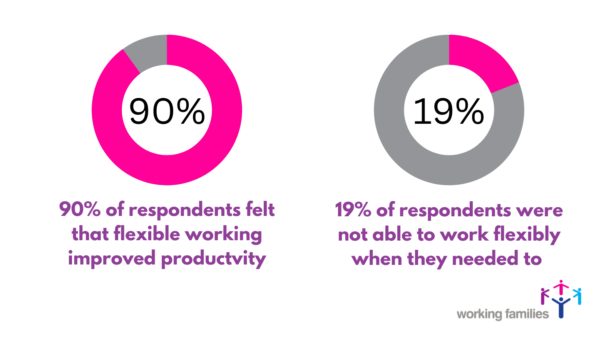Supporting families in site-based sectors
Published: 29 Nov 2022
For many people, flexible working has become the new normal. But not everyone has been able to enjoy the same access to flex. Almost half of working parents (46%) in the UK work in roles which require them to be at a specific location* which makes working remotely out of the question. If we’re to make flex fair for all, any conversation around flexible working must address the specific challenges of those parents and carers who work on-site, and start to find flexibility in every role.
The case for flexible working
We champion flex for all, because we believe everyone should be able to benefit from flexibility, especially when that flexibility can mitigate some of the effects of the current financial turmoil by helping reduce the costs of childcare and travel. But it’s not just a positive for employees – with flex proving to boost staff retention, improve performance and attract talent, employers stand to benefit too.
Flexible working in a cost-of-living crisis
Those who work in site-based sectors have the same need for flexibility as the rest of the population. Often flexible working helps people to manage childcare responsibilities but, in some cases, it can be the only route to employment and securing a meaningful income. The Working Families Index indicated that nearly a quarter of parents were able to use flexible working to share childcare with their partners instead of having to pay for formal childcare. In a cost-of-living crisis, money saved on prohibitive childcare costs can be a lifeline.
We surveyed people in site-based industries to get a fuller understanding of what’s needed to make flexibility work in these roles and unlock the benefits for all. The responses highlight that making positive progress in site-based flexible working starts with attitudes and perceptions and that communication holds the key to finding flexible solutions.
Culture matters
For the people we surveyed, having a culture that supports family friendly working was second most important after pay, and yet a third said their employer had no flexible working policy in place.

Creating an environment that not only facilitates ways of working to help employees meet the needs of their families but also ensures employees feel comfortable to take advantage of the flexibility on offer, is pivotal to unlocking the benefits of flexible working.
There is no single fix when it comes to developing a family-friendly culture, but having robust policies, training all levels of staff to better understand flexible working, and celebrating those who have different work patterns can send a positive message and give others the confidence to do the same.
Open conversation
The survey highlighted the importance of being able to bring your whole self to work. 81% of people surveyed said that to improve flexible working, a cultural shift was needed to allow them to talk openly about work-life balance issues.
Fostering a supportive culture where everyone feels able to be open about their needs is reliant on buy-in from management. Helping managers understand the business gains flexible working can offer is helpful in shifting attitudes and bringing line managers on board.
Communication is key
There is no one-size-fits-all when it comes to flexible working. For site-based workers, an individualised approach to flexibility is often more practical. But to find suitable solutions, a dialogue between employer and employee is needed. Of the people we asked 27% said that senior leaders didn’t understand the needs of parents and carers at all. Only 13% of respondents said they felt senior leaders completely understand the needs of parents and carers, and 66% said they think more support from managers to find solutions would improve flexible working.
Opening the lines of communication to consult with employees about their needs and their vision for flexibility can lead to creating tailored solutions that work for everyone.
Start from the top
Of those surveyed, 59% felt that to improve flexible working, a better understanding at board level of how flexible working could benefit the organisation is needed. Coaching or training can help tackle the perception of flexible working and role modelling is a powerful tool in shifting mindsets and facilitating discussions about finding working solutions in every role.
Wasted talent
Of those surveyed, 90% felt flexible working improved productivity. However, for 19% of people in the survey, they were not able to work flexibly when they needed to. This is significant given that our research carried out with YouGov showed that 59% of UK parents in site-based roles would be likely to consider leaving their job if they found another one that offered more flexible options.

Employers face the possibility of higher staff turnover, which could cost them significantly given the current skills shortages and recruitment costs. By finding flex in every role using a range of options, such as compressed or variable hours, staggered start times, flexi-time or job share, employers are more likely to retain valuable staff as well as attract a wider range of talent.
Flex for the future
Finding flexible solutions for parents and carers in site-based roles requires more innovative thinking and a willingness to embrace new ways of working, which can only be achieved through better understanding and supportive structures that can respond to their unique needs and challenges.
Whilst the answers for site-based workers are less straightforward than other sectors, the efforts are likely to pay dividends in higher productivity and staff retention. Moreover, it’s important we don’t leave site-based workers behind in the future of flexible working, and by not finding suitable solutions , we’re only solving half the problem.
*YouGov research carried out by Working Families and SF Recruitment, 2022